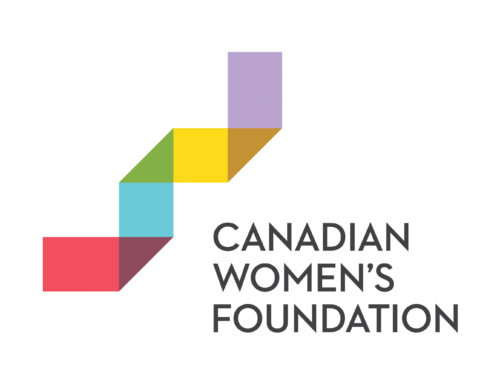Thousands of women in Canada—many of them single mothers—live on the financial brink, trapped in a constant cycle of violence;one step forward, two steps back.’ Customized supports can help them get unstuck.
This story was originally published in the Spring 2015 issue of SHE Magazine.

By the time she heard about the Women in Skilled Trades program in Burlington, she was in serious debt and had no savings. She successfully applied to the 29-week program but still struggled to make ends meet, even though the tuition was covered by the government.
Luckily for Kristin, the Women in Skilled Trades program included something special: an allowance to buy tools, work wear, and safety equipment. Without this extra support, she may not have been able to buy the tools that allowed her to find a job after graduation.
Over 1.5 million women in Canada live in poverty. Most, like Kristin, are working but earning low wages. “Just because you have a job and work 40 hours a week, doesn’t mean you’re going to get out of poverty,” says Ellen Faraday, a coordinator for the Women in Skilled Trades program.
Most women who live on a low income work in part-time or precarious jobs, with uncertain hours and no benefits. Most have children; many are single mothers. The vast majority long to create a better life for themselves and their children.
A training program can offer a light at the end of the tunnel, but even if they do find one—as Kristin did—their situations are so precarious that often the smallest crisis can cause them to drop out. No money to buy tools. An inability to find childcare. Scheduling conflicts. Problems like these are often the first domino: once it falls, the others soon follow.
But research shows that small, seemingly minor supports can make a surprising difference. The right kinds of supports—offered at just the right moment—can keep that first domino from falling. Called ‘wrap-around’ supports because they can address any sphere of a woman’s life, these additional services can make the difference between continually falling back and finally achieving financial independence.
“Before we offered these supports, women were leaving programs and they didn’t have a choice,” says Ellen. “They had to either get a job to put food on the table or left for other reasons. With the supports, we’ve actually seen a higher completion rate.”
Although the dollar value of wrap-around supports is usually small, their long-term impact can be huge. Kristin knows this first hand: that small investment in tools helped to launch her into an entirely new financial future. “I’m making much more than I was before,” she says. “I’m co-owner of a home and I’m in my last level of training for my plumbing apprenticeship. I’m confident in my abilities and I’m making a great name for myself in the plumbing community.”
Since Kristin graduated from the Women in Skilled Trades program, additional funding has allowed the staff to provide the women with even more supports, including food and gas vouchers and financial literacy training.
The program staff also work with the women to ensure they can meet their basic needs, because if the more unstable their everyday situation, the more likely they are to struggle in the program. “When they come in, we ask them to have a plan,” says Ellen. “We ask them: ‘Do you have daycare in place, do you have transportation, do you have a roof over your head, can you put food on the table?’”
Even when they do have a plan, many of the women are so close to the financial brink it doesn’t take much to push them over the edge. Many can’t afford to pay a medical or dental bill because they aren’t covered, or need help paying for transportation.
Given Canada’s chronic lack of affordable childcare, it’s not surprise many women also struggle to find reliable care for their children while they attend the programs. Should their carefully planned arrangements fall apart, as they often do, women must choose between taking caring for their children and showing up at the program. This juggling act is much harder for women who are single mothers. Add in an unexpected shift change at their part-time job, a crisis with a family member, or an unexpected expense, and it’s easy to see how seemingly small issues like balloon into major issues. Too often, women are forced to sacrifice their long-term advancement in order to solve short-term problems.
The women face other roadblocks too, from self-doubt to bureaucratic red tape to simply not knowing how to get started. Some experience domestic violence and face ongoing concerns about their personal safety. Many struggle with legal issues related to child custody, divorce, or immigration—that means court dates and appointments with lawyers. Women who are new to Canada may be socially isolated, without a network of friends or family to help out or provide moral support. And although most women who live in poverty are very good at managing their household budgets, they often need help with more complex issues like taxes and business finances related to self-employment.
Some wrap-around services are delivered directly by the economic development programs. For example, a few programs offer on-site childcare. Others provide services such as on-site job coaches to help women find work after finishing the program and to ensure a smooth transition into the workforce.
However, most programs offer wrap-around supports through referrals or partnership with other organizations; this expands their capacity and leverages their scarce resources. For example, at the Women in Skilled Trades program, workshops on violence prevention are delivered by experts from another community group. The program staff also negotiated discounts with local retailers. For every $100 she gives a woman for tools and work clothing, Rona kicks in $30 and Work Authority offers $50, plus a 10% discount.
To help a woman find the right service, program staff help her to identify her needs, whether it’s a food bank, a loan fund, emergency shelter, counseling, a legal service, court support, or another service. Research shows a ‘cookie-cutter’ approach to referrals doesn’t work, since women needs different kinds of help at different times. Wrap-around services must be customized because the next step out of poverty is different for each woman.
In the wrap-around model, the referral process goes far beyond handing over a brochure. The program staff offer ongoing advice and coaching. Navigating the complex world of community and government services can be difficult, especially for women who are new to Canada or whose first language isn’t English. But while staff do help women to identify their needs and point them in the right direction, they won’t take over or tell them what to do. Each woman must choose the next best step for herself. In order to help women reach the ultimate goal of financial independence, building confidence is crucial. Staff act as mentors, providing non-judgemental listening and words of encouragement as needed. They create an empowering atmosphere where the women learn to trust their own decisions and create their own social and business networks. Often, the women’s biggest supporters end up being one another: many of the women in the programs develop strong friendships and continue to network with one another after graduation.
Staff also help to open doors and cut through red tape. When Tara Taylor was attending the Women Unlimited skilled trades program in Nova Scotia, she realized she needed to take a physics course at Dalhousie University in order to achieve her dream of becoming a civil engineer. The program staff “pushed and pushed” to get her into the class. “They wanted to see my dream happen!” says Tara.
These seemingly simple actions can have a tremendous lifelong impact. Tara lives in Nova Scotia, where women’s average annual income is $25,200. According to a report by the Women’s Economic Equality Society, women who work in trades and technology can increase their earnings by 20 to 30 percent.
Christina Sachs, another Women Unlimited graduate, also faces a bright financial future, despite having overcome tremendous personal loss. Growing up, Christina and her younger brother Michael loved to work on cars with their father, a mechanic. She left high school at sixteen and worked in a series of low wage jobs. After her first child was born, she started exploring other career options. Meanwhile, Michael entered an automotive program and encouraged her to do the same. Then tragedy struck: he was killed in a car accident. Six months later, an employment counsellor suggested that Christina apply to Women’s Unlimited, and she eventually chose to enroll in the Automotive Collision Repair program.
Christina says the personal support offered by the program kept her going. Although she had never worked with auto body tools or done welding, the staff encouraged her. “If I needed a shoulder to cry on, I could count on them every time,” Christina says. “I got in that class and I’ve never looked back.”
For Ellen Faraday in Burlington, that’s a sentiment she never gets tired of hearing.
“I see women come in one way and leave another way,” she says. “They’ve realized they still have a long way to go, but now they’re moving in the right direction.”
The Women in Skilled Trade program is delivered by the Centre for Skills Development and Training in Burlington, Ontario. The Women Unlimited program is delivered by the Women’s CED Network Society and the WEE Society in Halifax, Lunenburg and Queens Counties.
Learn More:
- How These Women Working in the Trades Got Started
- “My desire for a better life overruled my fear”: Kathy’s Story
- Where Have all the Women Engineers Gone?
Take Action:
- Sign up for our e-newsletter to have our latest stories and resources sent to your inbox.
- Follow us on Facebook and Twitter to join a national conversation about gender equality.









[…] Two Steps Forward […]